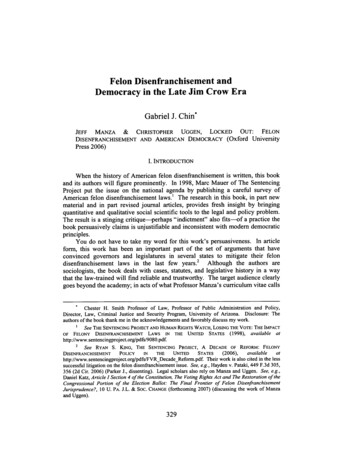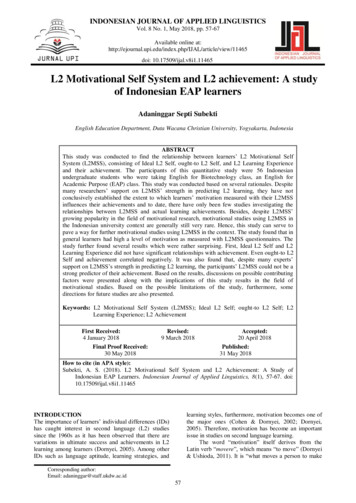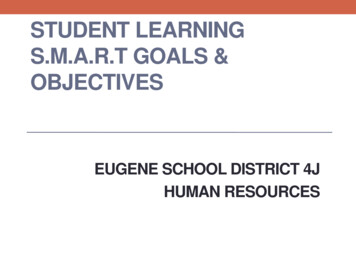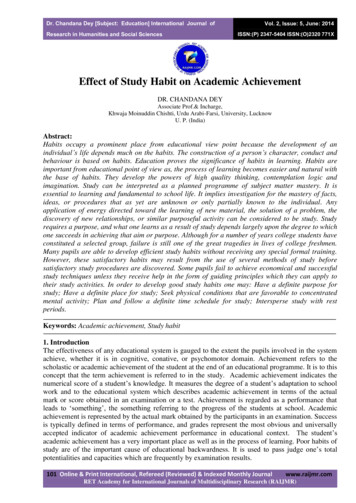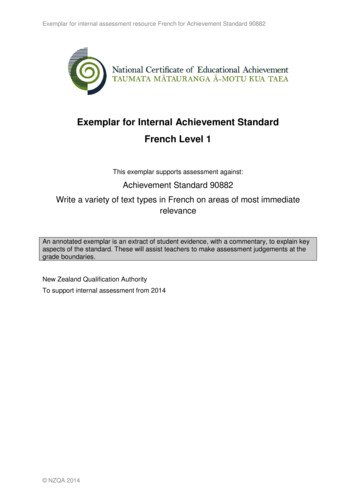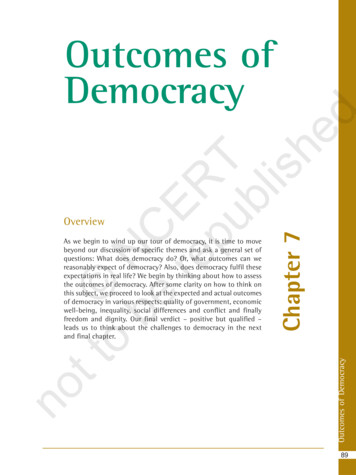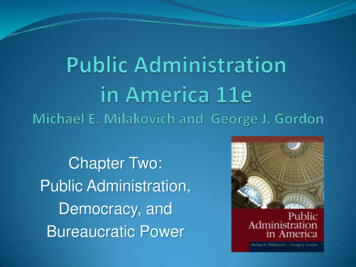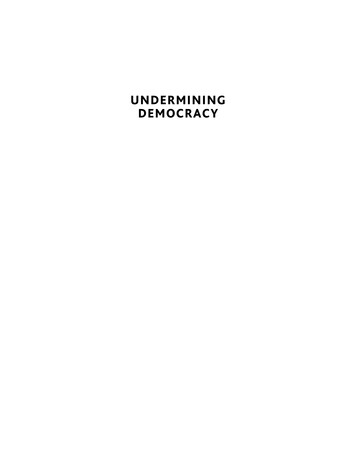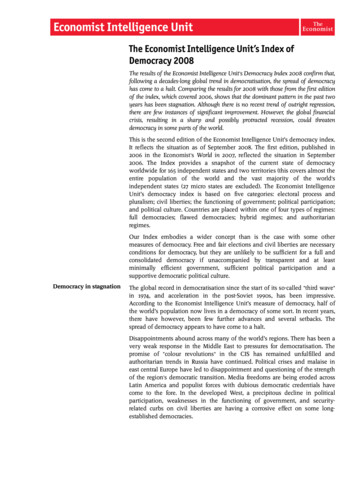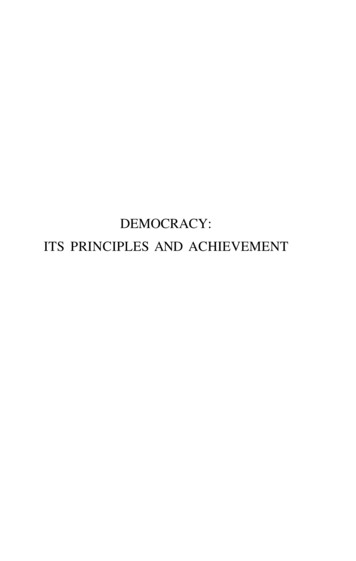
Transcription
DEMOCRACY:ITS PRINCIPLES AND ACHIEVEMENT
DEMOCRACY:ITS PRINCIPLES AND ACHIEVEMENTPublication prepared and edited by the Inter-Parliamentary UnionTexts contributed by:Cherif Bassiouni (General Rapporteur), David Beetham,Justice M. Fathima Beevi (Ms.), Abd-El Kader Boye,Awad El Mor, Hieronim Kubiak, Victor Massuh,Cyril Ramaphosa, Juwono Sudarsono, Alain Touraine,Luis VilloroInter-ParliamentaryGeneva1998Union
Inter-Parliamentary Union 1998All rights reserved. No part of this publication may be reproduced, stored in aretrieval system, or transmitted, in any form or by any means, electronic, mechanical,photocopying, recording or otherwise, without the prior permission ofthe Inter-Parliamentary Union.This book is sold subject to the condition that it shall not be a way of trade or otherwise,be lent, re-sold, hired out or otherwise circulated without the publisher's prior consentin any form of binding or cover other than that in which it is published and without a similarcondition including this condition being imposed on the subsequent publisher.ISBN 92-9142-036-0Published byTHE INTER-PARLIAMENTARY UNIONP.O.Box 4381211 Geneva 19SwitzerlandLayout, printing and binding by ATAR, Geneva, SwitzerlandCover design by Aloys Robellaz, Les Studios Lolos, Carouge, Switzerland
Table of ContentsFOREWORDPierre Cornillon, Secretary General, Inter-Parliamentary UnionUNIVERSAL DECLARATION ON DEMOCRACYAdopted by the Inter-Parliamentary Council at its 161st session(Cairo, 16 September 1997)TOWARD A UNIVERSAL DECLARATION ON THE BASIC PRINCIPLESOF DEMOCRACY: FROM PRINCIPLES TO REALIZATIONProfessor Cherif Bassiouni, General RapporteurIIll1DEMOCRACY: KEY PRINCIPLES, INSTITUTIONS AND PROBLEMSProfessor David Beetham21THE JUDICIARY IN DEMOCRATIC GOVERNANCE: SOMEINSIGHTS FROM THE INDIAN EXPERIENCEMs. Justice M. Fathima Beevi31SOME IMPORTANT PROBLEMS AND ASPECTS OF DEMOCRACYIN THE CONTEXT OF THE BLACK AFRICAN STATESProfessor Abd-El Kader Boye37TOWARDS A UNIVERSAL DECLARATION ON DEMOCRACYDr. Awad EI Mor47DEMOCRACY AND THE INDIVIDUAL WILLProfessor Hieronim Kubiak57DEMOCRACY: A DELICATE BALANCE AND UNIVERSALITYProfessor Victor Massuh67THE MAIN ELEMENTS OF DEMOCRACY:A SOUTH AFRICAN EXPERIENCEMr. Cyril Ramaphosa73DEMOCRACY-BUILDING IN SOUTHEAST ASIAProfessor Juwono Sudarsono81DEMOCRACY: ITS NECESSARY CONDITIONS, ITS ENEMIES ANDITS OPPORTUNITIESProfessor Alain Touraine87WHICH DEMOCRACY?Professor Luis Villoro95
ForewordThe word democracy is one of the most used terms of the political vocabulary.This vital concept, through its transcultural dimension and because it touchesthe very fundamentals of the life of human beings in society, has given rise tomuch written comment and reflection; nevertheless, until now there has notbeen any text adopted at the world-wide level by politicians which defined itsparameters or established its scope. This concept was probably in some wayfrozen by the opposition between plain or "formal" democracy and "popular"democracy which was current until recently in world-wide multilateral circles.These times are past; democracy - now unqualified - seems to be the subject ofbroad consensus and its promotion is high on the agenda of internationalbodies.On the initiative of Dr. Ahmed Fathy Sorour, then President of its Council,the Inter-Parliamentary Union decided in 1995 to embark on a Universal Declaration on Democracy in order to advance international standards and contribute to the process of democratisation under way in the world.This project followed naturally on the earlier work of the Union which hadrecently published several studies on the conduct of elections and political activities - a key element of the exercise of democracy - and had adopted in Parisin 1994 a Declaration on Criteria for Free and Fair Elections. It was nevertheless fairly audacious for the Union, a world-wide political organisation, to embark on this work and a serious and prudent approach was therefore taken sothat the wager could be won.As a first step, the Union wished to gather written opinions and thoughtsfrom personalities representative of the different geopolitical currents in orderto have a solid basis before starting to frame a preliminary draft. Twelve leadingfigures and experts kindly took up the Union's invitation to present in writingand after consultation among themselves their views on the principles andachievements of democracy.At the outset, the project captured the interest of UNESCO whose DirectorGeneral wished his Organisation also to be involved. Accordingly, the ExpertGroup members held a meeting at UNESCO Headquarters in Paris on 6 and7 December 1996 in order to co-ordinate their contributions. This Group included: Professor Cherif Bassiouni, Professor of Law, President, InternationalHuman Rights Law Institute, DePaul University, Chicago (United States ofAmerica), President, International Association of Penal Law; President, International Institute of Higher Studies in Criminal Sciences, who had agreed to actas General Rapporteur; Professor David Beetham, Director of the Centre forDemocratisation Studies of the University of Leeds (United Kingdom);Ms. Justice M. FathimaBeevi, Governor of Tamil Nadu State, former SupremeCourt Judge, Madras (India); Professor Abd-El Kader Boye, Faculty of Law ofthe University of Dakar (Senegal); Dr. Awad El Mor, Chief Justice of theSupreme Constitutional Court, Cairo (Egypt); Professor Steven Hanser, former
Chairman of the Department of History, Georgia State University (United Statesof America); Professor Hieronim Kubiak, Jegiellonian University, Institute ofSociology, Krakow (Poland); Professor Victor Massuh, University of BuenosAires (Argentina); Mr. Cyril Ramphosa, Former President of the ConstitutionalAssembly of South Africa (1994-1996); Mrs. Evi Fitriani, representing Professor Juwono Sudarsono, Dean of the Faculty of Political and Social Sciences ofthe University of Indonesia and Deputy Governor of the National DefenceInstitute; Professor Luis Villoro, Institute of Philosophical Studies (Mexico).Professor Alain Touraine, Director of the School of Higher Studies in SocialSciences, Paris (France), was unfortunately unable to attend the meeting.Mr. Janusz Symonides, Director of UNESCO's Division for Human Rights,Democracy and Peace, also contributed to the work of the Expert Group.In the months that followed, ten of these experts and the General Rapporteurpresented their written contributions. These texts were considered in April 1997in Seoul by the IPU's Executive Committee which was then able to launch thesecond stage of the project: the drafting of the Declaration itself.Drawn up in the following months by the General Rapporteur and the Secretariat of the Union, a first draft was closely studied by the Executive Committeewhose members, representing all the world's geopolitical regions, devoted tothis exercise an entire day specially added to the programme of their 225thsession in Cairo in September 1997.The text resulting from their deliberations was immediately made available toall the delegations of the Union gathered in Cairo for its 98th Conference and waspresented some days later to the Inter-Parliamentary Council - the plenary governing body of the Union - which adopted it without a vote on 16 September 1997.The inter-Parliamentary Union is pleased to publish in this book the text ofthe Universal Declaration on Democracy and well as the contributions of themembers of the Expert Group and the overall report of the General Rapporteur.The Union also wishes to take this opportunity to express its gratitude tothese persons for their valuable help towards the successful outcome of theproject and to UNESCO and its Director-General for their support to the undertaking. These thanks are also addressed to all those who, in various capacities,contributed to the exercise. Dr. Sorour deserves special mention for having hadthe merit of launching and closely following up this project which represents afine achievement for the Inter-Parliamentary Union.The Union's commitment to democracy will, however, be pursued far beyond the approval and publication of a text whose substantive implementationit is now striving to promote assiduously. Already, as these lines are written, theUnited Nations has taken note of this Declaration in a resolution adopted by theGeneral Assembly. It may therefore be hoped that other stones will be added tothe foundations which the Inter-Parliamentary Union has laid down with thispolitical proclamation and will complement its scope, perhaps even leading tothe adoption of an international juridical instrument.Pierre CornillonSecretary GeneralInter-Parliamentary UnionII
Universal declarationon democracyAdopted* by the Inter-Parliamentary Councilat its 161st session(Cairo, 16 September 1997)The Inter-Parliamentary Council,Reaffirming the Inter-Parliamentary Union's commitment topeace and development and convinced that the strengthening ofthe democratisation process and representative institutions willgreatly contribute to attaining this goal,Reaffirming also the calling and commitment of the InterParliamentary Union to promoting democracy and the establishment of pluralistic systems of representative government in theworld, and wishing to strengthen its sustained and multiformaction in this field,Recalling that each State has the sovereign right freely to chooseand develop, in accordance with the will of its people, its ownpolitical, social, economic and cultural systems without interference by other States in strict conformity with the United NationsCharter,Recalling also the Universal Declaration of Human Rightsadopted on 10 December 1948, as well as the International Covenant on Civil and Political Rights and the International Covenant on Economic, Social and Cultural Rights adopted on 16December 1966, the International Convention on the Eliminationof All Forms of Racial Discrimination adopted on 21 December1965 and the Convention on the Elimination of All Forms of Discrimination Against Women adopted on 18 December 1979,Recalling further the Declaration on Criteria for Free and FairElections which it adopted in March 1994 and in which it confirmed that in any State the authority of the government can derive only from the will of the people as expressed in genuine, freeand fair elections,Referring to the Agenda for Democratisation presented on20 December 1996 by the UN Secretary-General to the 51st session of the United Nations General Assembly,III
Adopts the following Universal Declaration on Democracyand urges Governments and Parliaments throughout the world tobe guided by its content:The principles of democracy1. Democracy is a universally recognised ideal as well as agoal, which is based on common values shared by peoples throughout the world community irrespective of cultural, political, socialand economic differences. It is thus a basic right of citizenship tobe exercised under conditions of freedom, equality, transparencyand responsibility, with due respect for the plurality of views, andin the interest of the polity.2. Democracy is both an ideal to be pursued and a mode ofgovernment to be applied according to modalities which reflectthe diversity of experiences and cultural particularities withoutderogating from internationally recognised principles, norms andstandards. It is thus a constantly perfected and always perfectiblestate or condition whose progress will depend upon a variety ofpolitical, social, economic and cultural factors.3. As an ideal, democracy aims essentially to preserve andpromote the dignity and fundamental rights of the individual, toachieve social justice, foster the economic and social development of the community, strengthen the cohesion of society andenhance national tranquillity, as well as to create a climate that isfavourable for international peace. As a form of government, democracy is the best way of achieving these objectives; it is alsothe only political system that has the capacity for self-correction.4. The achievement of democracy presupposes a genuine partnership between men and women in the conduct of the affairs ofsociety in which they work in equality and complementarity, drawing mutual enrichment from their differences.5. A state of democracy ensures that the processes by whichpower is acceded to, wielded and alternates allow for free political competition and are the product of open, free and nondiscriminatory participation by the people, exercised in accordancewith the rule of law, in both letter and spirit.6. Democracy is inseparable from the rights set forth in theinternational instruments recalled in the preamble. These rightsIV
must therefore be applied effectively and their proper exercisemust be matched with individual and collective responsibilities.7. Democracy is founded on the primacy of the law and theexercise of human rights. In a democratic State, no one is abovethe law and all are equal before the law.8. Peace and economic, social and cultural development areboth conditions for and fruits of democracy. There is thus interdependence between peace, development, respect for and observance of the rule of law and human rights.Theelementsand exerciseof democratic government9. Democracy is based on the existence of well-structuredand well-functioning institutions, as well as on a body of standards and rules and on the will of society as a whole, fully conversant with its rights and responsibilities.10. It is for democratic institutions to mediate tensions andmaintain equilibrium between the competing claims of diversityand uniformity, individuality and collectivity, in order to enhancesocial cohesion and solidarity.11. Democracy is founded on the right of everyone to take partin the management of public affairs; it therefore requires the existence of representative institutions at all levels and, in particular, aParliament in which all components of society are represented andwhich has the requisite powers and means to express the will of thepeople by legislating and overseeing government action.12. The key element in the exercise of democracy is the holdingof free and fair elections at regular intervals enabling the people'swill to be expressed. These elections must be held on the basis ofuniversal, equal and secret suffrage so that all voters can choosetheir representatives in conditions of equality, openness and transparency that stimulate political competition. To that end, civil andpolitical rights are essential, and more particularly among them, therights to vote and to be elected, the rights to freedom of expressionand assembly, access to information and the right to organise political parties and carry out political activities. Party organisation, activities, finances, funding and ethics must be properly regulated inan impartial manner in order to ensure the integrity of the democratic processes.V
13. It is an essential function of the State to ensure the enjoyment of civil, cultural, economic, political and social rights to itscitizens. Democracy thus goes hand in hand with an effective,honest and transparent government, freely chosen and accountable for its management of public affairs.14. Public accountability, which is essential to democracy, applies to all those who hold public authority, whether elected ornon-elected, and to all bodies of public authority without exception. Accountability entails a public right of access to information about the activities of government, the right to petition government and to seek redress through impartial administrative andjudicial mechanisms.15. Public life as a whole must be stamped by a sense of ethicsand by transparency, and appropriate norms and procedures mustbe established to uphold them.16. Individual participation in democratic processes and public life at all levels must be regulated fairly and impartially andmust avoid any discrimination, as well as the risk of intimidationby State and non-State actors.17. Judicial institutions and independent, impartial and effective oversight mechanisms are the guarantors for the rule of law onwhich democracy is founded. In order for these institutions andmechanisms fully to ensure respect for the rules, improve the fairness of the processes and redress injustices, there must be access byall to administrative and judicial remedies on the basis of equalityas well as respect for administrative and judicial decisions both bythe organs of the State and representatives of public authority andby each member of society.18. While the existence of an active civil society is an essentialelement of democracy, the capacity and willingness of individuals to participate in democratic processes and make governancechoices cannot be taken for granted. It is therefore necessary todevelop conditions conducive to the genuine exercise of participatory rights, while also eliminating obstacles that prevent, hinderor inhibit this exercise. It is therefore indispensable to ensure thepermanent enhancement of, inter alia, equality, transparency andeducation and to remove obstacles such as ignorance, intolerance,apathy, the lack of genuine choices and alternatives and the absence of measures designed to redress imbalances or discrimination of a social, cultural, religious and racial nature, or for reasonsof gender.VI
19. A sustained state of democracy thus requires a democraticclimate and culture constantly nurtured and reinforced by education and other vehicles of culture and information. Hence, a democratic society must be committed to education in the broadest senseof the term, and more particularly civic education and the shapingof a responsible citizenry.20. Democratic processes are fostered by a favourable economic environment; therefore, in its overall effort for development, society must be committed to satisfying the basic economicneeds of the most disadvantaged, thus ensuring their full integration in the democratic process.21. The state of democracy presupposes freedom of opinionand expression; this right implies freedom to hold opinions without interference and to seek, receive and impart information andideas through any media and regardless of frontiers.22. The institutions and processes of democracy must accommodate the participation of all people in homogeneous as well asheterogeneous societies in order to safeguard diversity, pluralismand the right to be different in a climate of tolerance.23. Democratic institutions and processes must also fosterdecentralised local and regional government and administration,which is a right and a necessity, and which makes it possible tobroaden the base of public participation.Theinternationaldimensionof democracy24. Democracy must also be recognised as an international principle, applicable to international organisations and to States intheir international relations. The principle of international democracy does not only mean equal or fair representation of States;it also extends to the economic rights and duties of States.25. The principles of democracy must be applied to the international management of issues of global interest and the commonheritage of humankind, in particular the human environment.26. To preserve international democracy, States must ensurethat their conduct conforms to international law, refrain from theuse or threat of force and from any conduct that endangers orviolates the sovereignty and political or territorial integrity of otherVII
States, and take steps to resolve their differences by peacefulmeans.27. A democracy should support democratic principles in international relations. In that respect, democracies must refrainfrom undemocratic conduct, express solidarity with democraticgovernments and non-State actors like non-governmentalorganisations which work for democracy and human rights, andextend solidarity to those who are victims of human rights violations at the hands of undemocratic regimes. In order to strengtheninternational criminal justice, democracies must reject impunityfor international crimes and serious violations of fundamentalhuman rights and support the establishment of a permanent international criminal court.* After the Declaration was adopted, the delegation of China expressed reservations to the text.On 16 September 1097, 137 national parliaments were members of the Inter-ParliamentaryUnion. Representatives from the parliaments of the following 128 countries look part in the workof the Cairo Conference:Albania, Algeria, Andorra, Angola, Argentina, Armenia, Australia, Austria, Azerbaijan, Bangladesh.Belarus, Belgium, Benin, Bolivia, Botswana, Brazil, Bulgaria, Burkina Faso, Cambodia. Cameroon,Canada, Cape Verde, Chile, China, Colombia, Costa Rica, Croatia, Cuba. Cyprus, Czech Republic, Democratic People's Republic of Korea, Denmark, Djibouti, Ecuador, Egypt, El Salvador,Estonia, Ethiopia, Fiji, Finland, France, Gabon, Georgia, Germany, Ghana, Greece, Guatemala,Guinea, Hungary, Iceland, India, Indonesia, Iran (Islamic Republic of), Iraq, Ireland, Israel, Italy,Japan, Jordan, Kazakstan, Kuwait. Kyrgyzstan, Latvia, Lebanon, Libyan Arab Jamahiriya, Lidiuania,Luxembourg, Malawi, Malaysia. Mali, Malta, Mauritania, Mauritius, Mexico, Monaco, Mongolia,Morocco, Mozambique, Namibia, Nepal, Netherlands, New Zealand, Nicaragua, Niger, Norway,Pakistan, Panama, Papua New Guinea, Paraguay, Peru, Philippines, Poland, Portugal, Republic ofKorea, Republic of Moldova, Romania, Russian Federation, Rwanda, San Marino, Senegal,Singapore, Slovakia, Slovenia, South Africa, Spain, Sri Lanka, Sudan, Suriname, Sweden,Switzerland, Syrian Arab Republic, Tajikistan, Thailand, The former Yugoslav Republic ofMacedonia, Togo, Tunisia, Turkey, Uganda, United Kingdom, United Republic of Tanzania,Uruguay, Uzbekistan, Venezuela. Viet Nam, Yemen, Yugoslavia, Zambia, ZimbabweVIII
Toward a Universal Declaration onthe Basic Principles of Democracy:From Principles to RealisationPROFESSOR CHERIF BASSIOUNI *General Rapporteur"In democracy, liberty is to be supposed; for it is commonlyheld that no man is free in any government"Aristotle, Politics (Lib. VI, Cap. ii. 350 BC)".And matters are by consultation between them."Qu 'rein (Surat al-Shum, 42:38, (622)"A commonwealth is said to be instituted, when a multitude ofmen do agree and covenant, everyone with everyone, that towhatsoever man, or assembly of men, shall be given by the major part the right to present the present of them all, that is to say,to be their representative; everyone, as well as he that voted forit as he that voted against it, shall authorize all the actions andjudgments of that man, or assembly of men, in the same manneras if they were his own, to the end to live peaceably amongstthemselves and be protected against other men."Thomas Hobbes, Leviathan ( O F COMMONWEALTH,Chapter XVII, "Of the Rights of Sovereignsby Institution", 1651)"This country, with its institutions, belongs to the people whoinhabit it. Whenever they shall grow weary of existing government they can exercise their constitutional right of amending it,or their revolutionary right to dismember it."Abraham Lincoln, Inaugural Address, 1861"Many forms of government have been tried, and will be tried inthis world of sin and woe. No one pretends that democracy isperfect or all-lies. Indeed, it has been said that democracy is theworst form of Government except all those other forms thathave been tried from time to time."Winston Churchill, House of Commons,11 November 1947* Professor of Law. President. International Human Rights Law Institute. DePaul University. Chicago (United Slatesof America); President, International Association of Penal Law; President, International Institute of Higher Studies inCriminal Sciences1
TOWARD A UNIVERSAL DECLARATIONFrom principles to realization:Some general considerationsA. Meaning and ContentThe term ''democracy"' means different things to different people and that conclusion is accepted by most commentators.2 Indeed, there is a wide range ofperspectives as to the meaning and content of democracy as well as to the conditions of its realization; all of which vary depending on the proponents' philosophical, ideological, political, cultural, social, and economic perspectives.This range of perceptions goes from the higher conceptual plane as expressed,for example, by the great thinkers of western civilization3 and by other greatnon-western political philosophers,4 to the practical means of application as' RANDOM HOUSE DICTIONARY (unabridged ed. 1967) definesde-moc-ra-cy (di mok'ras ),/(., ni. cies. 1, governmentby the people; a form of government in which ihe supreme power is vested in ihe people and exercised by them or bytheir elected agents under a free electoral system. 2. a state having such a form of government. 3. a state in which thesupreme power is vested in the people arid exercised directly by them rather than by elected representatives. 4. a stateof society characterized by forma! equality of rights and privileges. 5. political or social equality; democratic spirit.6. the common people of a community as distinguished from any privileged class; the common people with respect totheir political power. 7. (cop. I U.S. a. the principles of the Democratic party, b. the Democratic parly or its members.\ F. democratic, LL Democratut. GK djnokratic popular government, equiv. To d mo- demo -kratic -cracyj.Demokratia was founded in Athens by Cleisthenes in the fifth century with the introduction of the Council of FiveHundred. For the history of Demokratia in Greece, see Raphael Sealey, The Origin of Demokratia, 6 CALIFORNIASTUDIES IN CLASSICAL ANT IQUITY 253 (1973); see also RAPHAEL SEALEY, A HISTORY or THE GREEK CITY STATES (Universityof California Press. Berkeley, CA. U S A . 1976); and JAKOB AALL. OTTESEN LARSFN, REPRESENTATIVE: GOVERNMENT INGREEK AND ROMAN HISTORY (University of California Press. Berkeley. CA, USA. 1955).:Even Herodotus said ihal "Demokratia has complex implications." See SEALEY. supra note 1. at 371. Herodotusdeemed Demokratia to be the rule of law as opposed to the arbitrary rule of Tyrants. For the history of politicalinstitutions, see e.g. ANDRE AYMARD & JEANNINF: AUHOYLR. I L'ORIENT ET I A GREC I ANTIQUE (Presses Untversitaires deFrance, Paris. France, 19.13). JEAN IMBERT. GERARD SAUIEL & MARGUERITE BOL'LEI-SAITEL, HISTOIRE LIES INSTIII TIONS ETDES FAITSSIHTAUX (Presses Universitairesde France. Paris. France, Vol. I, 1957, Vol.2. 1961).1See THOMAS AguiNAs, BASIC WRITINGS OF SAIN'I THOMAS AQUINAS (Anton C. Pegis ed., Random House, New York.NY, USA, 1945); ARISTOTLE, NICOMACHEAN ETHICS (Terence Irwin trans., Hackett Publisher Co. Indianapolis, IN,USA, 1985) (written in 350 B C ) , A R I S T O T I , POLITICS (Stephen Everson ed., Cambridge University Press. New York.NY. USA, ]9&&) (written in 350 BC); ERNEST BARKER. THE POLITICAL THOUGHT OE PLATO AND ARISTOTLE. (Dover Publi-cations, New York. NY, USA, 1959); JEAN BODIN, DE REPUBLICA LIBRI Six (Apud lacobum Du Puys Sub SignoSamaritanae. Parisiis, 15Xn); MAKCUS TULEIUS CICERO. DE REPUBLICA DE LEGIHUS (Clinton Walker Keyes trans.,Harvard University Press, Cambridge, MA, USA. 1966) (Org. pub. in 1670); CONDORCET, OUTLINES OF AN HISTORICALVIEW OF THE PROGRESS or MAN (Lang and Ustick, Philadelphia, PN, U S A . 1796); GEOKC. WILHELM FRIEDRICH H E G E L , T H EPHILOSOPHY OF HISTORY (J. Sibree trans., Dover Publications. New York, NY. USA. 1956) (2nd ed. pub. in 1S57);THOMAS HOBBES, LEVIATHAN (A.R. Waller ed., Cambridge University Press. Cambridge. UK, 1904) (Org. pub. in1651); DAVIII HUMS. POUIICAI ESSAYS (Charles W. Handel ed., Bobbs-Merrill, Indianapolis, IN. USA. 1953);EMMANUEL KANT, THE CATEGORICAL IMPERATIVE (Commuiiican, Houston, TX, USA, 1990) (Org. pub. in 1797); JOHNLOCKE. TREATISE ON Crvu. GOVERNMENT (Charles L, Sherman ed., D. Appleton-Century Co. New York. NY. USA.1965); JOHN STUART MILL. O N LIBERTY (R.B. McCallum ed. Macmillan Co., New York, NY, USA, 1946) (Org. pub. inLondon 1859); THOMAS PAINE. THE RIGHTS OF MAN (Eckler, London. UK, 1792); PLATO, THE REPUBLIC (Penguin Books,London, UK, 1970); BAKON DE MONTESQUIEU, SPIRIT OI-mi: LAW (Cambridge University Press. Cambridge, UK, 1989);THL STOIC AND EPICUREAN PHIIOSOPHERS: THE COMPLETE EXTENT WRITINGS or EPICURES, EPICTETUS, LUCRETIUS (AND)MARCUS AUREUUS (Whitney Jennings Oates ed. Random House. New York, NY, USA. 1940). For a recent anthologywhich includes most of the major modern political theories, see CLASSICS OF MODEKN POLITICAL THEORY (Steven M.Cahn ed., Oxford University Press, Oxford. UK, 1996).4See for example THE HISTORY OF AT-TABARI (Ismail K. Poonawala irans., and annotated, State University Press. NewYork, NY. USA, 12 Vols. 1990): BN KHALIXHJN THE MAQUADDIMAH (Fray Rosenthal trans., Bollenger Series, NewYork NY, USA, 3 Vols. 1958); Hamilton A.R. Gibb, Some Considerations on the Sunnii Theory- of the Caliphate, inARCHIVES HISTOIRK DU DROIT ORIENTAL 401 -410 (Wetteren. Paris, France. 1939); Hamilton A.R. Gibb, The Evolution ofGovernment in Early Islam. IV STUPIA ISLAMICA 1-17(1933). In Islam there are three relevant principles: One is that ofBa'ia, which is a form of popular election; shura. which is specified in the Qu'rat\ and is equivalent to a popularreferendum or to a legislative process; and ijma which means popular consensus, see M. Cherif Bassiouni, Sources ofIslamic Law and the Protection of Human Rights in the Islamic Criminal Justice Svstem, in THE ISLAMIC CRIMINALJUSTICE SYSTEM 3-54 (M. Cherif Bassiouni ed. Oceana Publications, Dobbs Ferry. NY, USA. 1982].2
CHERII- BASSKKMexpressed by contemporary experts.5 To be sure, however, the antithesis of democracy as recognized by almost all post 1900's political thinkers, are the ideologies of fascism, communism, and totalitarianism.6Conceptually, there are three basic paradigms which are addressed by contemporary commentators. They are: (i) the universality or relativ
and responsibility, with due respect for the plurality of views, and in the interest of the polity. 2. Democracy is both an ideal to be pursued and a mode of government to be applied according to modalities which reflect the diversity of experiences and cultural particularities without
